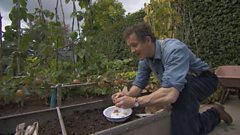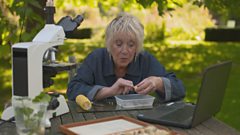
Episode 27
Charge your glasses as Joe Swift visits a drinkable allotment in London where much of the produce is grown to make beer, wine and cider. And in the first of a five-part series about botany, Carol Klein looks at the capsules of potential that herald the start and end of most plants' lives - seeds.
Last on
Clips
-
![]()
Garlic in a pot
Duration: 02:16
-
![]()
How seeds work
Duration: 06:11
Community orchards

There are several communal juicing initiatives for people who would like to make juice or cider from their own apples. For more information, the Orchard Network is a good place to start, or you could try your local authority or Wildlife Trust. And if you fancy attending an Apple Day event next month, check out the link below. There’s plenty going on and there are often experts on hand if you want to know the name of an apple you’re growing.
��(�ɷɷ�.�ǰ�������Ա�ٷɴǰ���.�ǰ���.�ܰ�)
Garden featured
Cambridge University Botanic Garden
1 Brookside
Cambridge
CB2 1JE
Tel. 01223 336265
A lot of the filming for Carol’s fascinating botany series took place here. It’s open every day of the week and is a great place to visit if you happen to be in the area.
(www.botanic.cam.ac.uk)
Garlic
There are two main types of garlic – hardneck and softneck. Hardneck varieties are composed of a few large cloves that are easier to peel in the kitchen, but as a rule, don’t store much beyond Christmas. They often produce a flowering shoot called a scape over the summer that must to be nipped out as soon as it appears. Softneck varieties, on the other hand, are easier to grow and tend to keep for longer. Their cloves are smaller than those of a hardneck, but are just as strong tasting.
The general rule of thumb is to plant garlic before Christmas, starting from late autumn. It needs a long growing season to do well and benefits from being chilled in the ground early on in its development - a month below 10°C ideally. If, like Monty, you plan to grow it in a container, keep the soil moist but not overwatered, as an excess of moisture could cause the bulbs to rot.
(www.rhs.org.uk)
Jobs for the weekend: Plant prepared hyacinths
There’s nothing more cheery than the scent of hyacinths perfuming a room on a cold winter’s day, and if you want to have some in flower for Christmas, now’s the time to plant them. All you need is a shallow bowl with a hole in it and some bulb fibre or compost. When buying the bulbs, make sure you select those that are labelled as ‘prepared’. Plant the bulbs so that their necks are just showing and give them a drink. Place somewhere cool and dark until the shoots are about 4cm (1½in) long, and then bring into the light.
(www.rhs.org.uk)
Jobs for the weekend: Trim shrub roses
Shrub roses are tough beasts and pretty much look after themselves once they get established. But if they start getting unruly, it’s worth giving them a quick haircut at this time of year.
(www.rhs.org.uk)
Jobs for the weekend: Cut back lavender
Lavenders should be pruned every year to help maintain their shape and you can either do this now, or in the spring when the new growth starts. Cut back all of the dead flowers along with any excess foliage, but don’t, whatever you do, cut back into the old wood! And if your plants are in pots, consider moving them to a more sheltered spot to help protect them over the winter.
(www.rhs.org.uk)
Credits
| Role | Contributor |
|---|---|
| Presenter | Monty Don |
| Presenter | Joe Swift |
| Presenter | Carol Klein |
| Series Producer | Chloe Rawlings |
| Series Editor | Liz Rumbold |
Broadcasts
- Fri 25 Sep 2015 20:30
- Sat 26 Sep 2015 18:15������̳ Two except Northern Ireland
- Sun 27 Sep 2015 06:45
- Fri 2 Oct 2015 08:15


